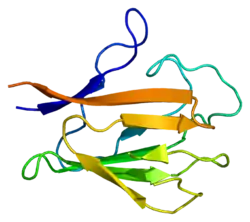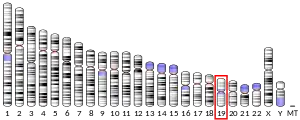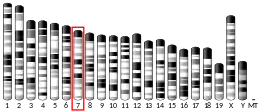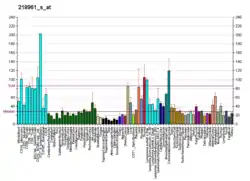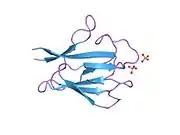Bifunctional polynucleotide phosphatase/kinase is an enzyme that in humans is encoded by the PNKP gene.[5][6][7] A detailed structural study of the crystallized mouse protein examined both the 5´-polynucleotide kinase and 3’-polynucleotide phosphatase activities.[8] Additional features of the peptide sequence include a forkhead association (FHA) domain, ATP binding site and nuclear and mitochondrial localization sequences.
Interactions
PNKP has been shown to interact with DNA polymerase beta[9] and XRCC1.[9][10]
Role in neurologic disease
The human gene encoding PNKP was observed to be mutated in patients[11][12][13][14] with microcephaly, seizures and defects in DNA repair. A type of recessive ataxia is also associated with PNKP mutations.[15] There are also newly characterized pathological variants of PNKP.[16] Model organisms such as mice and Drosophila have been used to generate further insights.[17][18]
References
- 1 2 3 GRCh38: Ensembl release 89: ENSG00000039650 - Ensembl, May 2017
- 1 2 3 GRCm38: Ensembl release 89: ENSMUSG00000002963 - Ensembl, May 2017
- ↑ "Human PubMed Reference:". National Center for Biotechnology Information, U.S. National Library of Medicine.
- ↑ "Mouse PubMed Reference:". National Center for Biotechnology Information, U.S. National Library of Medicine.
- ↑ Jilani A, Ramotar D, Slack C, Ong C, Yang XM, Scherer SW, Lasko DD (September 1999). "Molecular cloning of the human gene, PNKP, encoding a polynucleotide kinase 3'-phosphatase and evidence for its role in repair of DNA strand breaks caused by oxidative damage". J. Biol. Chem. 274 (34): 24176–86. doi:10.1074/jbc.274.34.24176. PMID 10446192.
- ↑ Karimi-Busheri F, Daly G, Robins P, Canas B, Pappin DJ, Sgouros J, Miller GG, Fakhrai H, Davis EM, Le Beau MM, Weinfeld M (September 1999). "Molecular characterization of a human DNA kinase". J. Biol. Chem. 274 (34): 24187–94. doi:10.1074/jbc.274.34.24187. PMID 10446193.
- ↑ "Entrez Gene: PNKP polynucleotide kinase 3'-phosphatase".
- ↑ Garces, Fernando; Pearl, Laurence H.; Oliver, Antony W. (November 2011). "The Structural Basis for Substrate Recognition by Mammalian Polynucleotide Kinase 3′ Phosphatase". Molecular Cell. 44 (3): 385–396. doi:10.1016/j.molcel.2011.08.036. PMC 4820033. PMID 22055185.
- 1 2 Whitehouse CJ, Taylor RM, Thistlethwaite A, Zhang H, Karimi-Busheri F, Lasko DD, Weinfeld M, Caldecott KW (January 2001). "XRCC1 stimulates human polynucleotide kinase activity at damaged DNA termini and accelerates DNA single-strand break repair". Cell. 104 (1): 107–17. doi:10.1016/S0092-8674(01)00195-7. PMID 11163244. S2CID 1487128.
- ↑ Ewing RM, Chu P, Elisma F, Li H, Taylor P, Climie S, McBroom-Cerajewski L, Robinson MD, O'Connor L, Li M, Taylor R, Dharsee M, Ho Y, Heilbut A, Moore L, Zhang S, Ornatsky O, Bukhman YV, Ethier M, Sheng Y, Vasilescu J, Abu-Farha M, Lambert JP, Duewel HS, Stewart II, Kuehl B, Hogue K, Colwill K, Gladwish K, Muskat B, Kinach R, Adams SL, Moran MF, Morin GB, Topaloglou T, Figeys D (2007). "Large-scale mapping of human protein-protein interactions by mass spectrometry". Mol. Syst. Biol. 3 (1): 89. doi:10.1038/msb4100134. PMC 1847948. PMID 17353931.
- ↑ Dumitrache, Lavinia C.; McKinnon, Peter J. (2017). "Polynucleotide kinase-phosphatase (PNKP) mutations and neurologic disease". Mechanisms of Ageing and Development. 161 (Pt A): 121–129. doi:10.1016/j.mad.2016.04.009. PMC 5161711. PMID 27125728.
- ↑ Shen, Jun; Gilmore, Edward C; Marshall, Christine A; Haddadin, Mary; Reynolds, John J; Eyaid, Wafaa; Bodell, Adria; Barry, Brenda; Gleason, Danielle; Allen, Kathryn; Ganesh, Vijay S (2010). "Mutations in PNKP cause microcephaly, seizures and defects in DNA repair". Nat Genet. 42 (3): 245–249. doi:10.1038/ng.526. ISSN 1061-4036. PMC 2835984. PMID 20118933.
- ↑ Issa, Lina; Mueller, Katrin; Seufert, Katja; Kraemer, Nadine; Rosenkotter, Henning; Ninnemann, Olaf; Buob, Michael; Kaindl, Angela M; Morris-Rosendahl, Deborah J (2013). "Clinical and cellular features in patients with primary autosomal recessive microcephaly and a novel CDK5RAP2 mutation". Orphanet Journal of Rare Diseases. 8 (1): 59. doi:10.1186/1750-1172-8-59. ISSN 1750-1172. PMC 3639195. PMID 23587236.
- ↑ Kalasova, Ilona; Hanzlikova, Hana; Gupta, Neerja; Li, Yun; Altmüller, Janine; Reynolds, John J.; Stewart, Grant S.; Wollnik, Bernd; Yigit, Gökhan; Caldecott, Keith W. (2019). "Novel PNKP mutations causing defective DNA strand break repair and PARP1 hyperactivity in MCSZ". Neurol Genet. 5 (2): e320. doi:10.1212/NXG.0000000000000320. ISSN 2376-7839. PMC 6454307. PMID 31041400.
- ↑ Bras, Jose; Alonso, Isabel; Barbot, Clara; Costa, Maria Manuela; Darwent, Lee; Orme, Tatiana; Sequeiros, Jorge; Hardy, John; Coutinho, Paula; Guerreiro, Rita (2015). "Mutations in PNKP Cause Recessive Ataxia with Oculomotor Apraxia Type 4". The American Journal of Human Genetics. 96 (3): 474–479. doi:10.1016/j.ajhg.2015.01.005. PMC 4375449. PMID 25728773.
- ↑ Gatti, Marta; Magri, Stefania; Nanetti, Lorenzo; Sarto, Elisa; Di Bella, Daniela; Salsano, Ettore; Pantaleoni, Chiara; Mariotti, Caterina; Taroni, Franco (2019). "From congenital microcephaly to adult onset cerebellar ataxia: Distinct and overlapping phenotypes in patients with PNKP gene mutations". American Journal of Medical Genetics Part A. 179 (11): 2277–2283. doi:10.1002/ajmg.a.61339. ISSN 1552-4825. PMID 31436889. S2CID 201275630.
- ↑ Shimada, Mikio; Dumitrache, Lavinia C; Russell, Helen R; McKinnon, Peter J (2015). "Polynucleotide kinase–phosphatase enables neurogenesis via multiple DNA repair pathways to maintain genome stability". The EMBO Journal. 34 (19): 2465–2480. doi:10.15252/embj.201591363. ISSN 0261-4189. PMC 4601665. PMID 26290337.
- ↑ Chakraborty, Anirban; Tapryal, Nisha; Venkova, Tatiana; Mitra, Joy; Vasquez, Velmarini; Sarker, Altaf H.; Duarte-Silva, Sara; Huai, Weihan; Ashizawa, Tetsuo; Ghosh, Gourisankar; Maciel, Patricia (2020-04-07). "Deficiency in classical nonhomologous end-joining–mediated repair of transcribed genes is linked to SCA3 pathogenesis". Proceedings of the National Academy of Sciences. 117 (14): 8154–8165. Bibcode:2020PNAS..117.8154C. doi:10.1073/pnas.1917280117. ISSN 0027-8424. PMC 7148577. PMID 32205441.
Further reading
- Whitehouse CJ, Taylor RM, Thistlethwaite A, Zhang H, Karimi-Busheri F, Lasko DD, Weinfeld M, Caldecott KW (2001). "XRCC1 stimulates human polynucleotide kinase activity at damaged DNA termini and accelerates DNA single-strand break repair". Cell. 104 (1): 107–17. doi:10.1016/S0092-8674(01)00195-7. PMID 11163244. S2CID 1487128.
- Chappell C, Hanakahi LA, Karimi-Busheri F, Weinfeld M, West SC (2002). "Involvement of human polynucleotide kinase in double-strand break repair by non-homologous end joining". EMBO J. 21 (11): 2827–32. doi:10.1093/emboj/21.11.2827. PMC 126026. PMID 12032095.
- Strausberg RL, Feingold EA, Grouse LH, Derge JG, Klausner RD, Collins FS, Wagner L, Shenmen CM, Schuler GD, Altschul SF, Zeeberg B, Buetow KH, Schaefer CF, Bhat NK, Hopkins RF, Jordan H, Moore T, Max SI, Wang J, Hsieh F, Diatchenko L, Marusina K, Farmer AA, Rubin GM, Hong L, Stapleton M, Soares MB, Bonaldo MF, Casavant TL, Scheetz TE, Brownstein MJ, Usdin TB, Toshiyuki S, Carninci P, Prange C, Raha SS, Loquellano NA, Peters GJ, Abramson RD, Mullahy SJ, Bosak SA, McEwan PJ, McKernan KJ, Malek JA, Gunaratne PH, Richards S, Worley KC, Hale S, Garcia AM, Gay LJ, Hulyk SW, Villalon DK, Muzny DM, Sodergren EJ, Lu X, Gibbs RA, Fahey J, Helton E, Ketteman M, Madan A, Rodrigues S, Sanchez A, Whiting M, Madan A, Young AC, Shevchenko Y, Bouffard GG, Blakesley RW, Touchman JW, Green ED, Dickson MC, Rodriguez AC, Grimwood J, Schmutz J, Myers RM, Butterfield YS, Krzywinski MI, Skalska U, Smailus DE, Schnerch A, Schein JE, Jones SJ, Marra MA (2002). "Generation and initial analysis of more than 15,000 full-length human and mouse cDNA sequences". Proc. Natl. Acad. Sci. U.S.A. 99 (26): 16899–903. Bibcode:2002PNAS...9916899M. doi:10.1073/pnas.242603899. PMC 139241. PMID 12477932.
- Mani RS, Karimi-Busheri F, Fanta M, Cass CE, Weinfeld M (2003). "Spectroscopic studies of DNA and ATP binding to human polynucleotide kinase: evidence for a ternary complex". Biochemistry. 42 (41): 12077–84. doi:10.1021/bi030127b. PMID 14556639.
- Loizou JI, El-Khamisy SF, Zlatanou A, Moore DJ, Chan DW, Qin J, Sarno S, Meggio F, Pinna LA, Caldecott KW (2004). "The protein kinase CK2 facilitates repair of chromosomal DNA single-strand breaks". Cell. 117 (1): 17–28. doi:10.1016/S0092-8674(04)00206-5. PMID 15066279. S2CID 8592154.
- Colland F, Jacq X, Trouplin V, Mougin C, Groizeleau C, Hamburger A, Meil A, Wojcik J, Legrain P, Gauthier JM (2004). "Functional proteomics mapping of a human signaling pathway". Genome Res. 14 (7): 1324–32. doi:10.1101/gr.2334104. PMC 442148. PMID 15231748.
- Wiederhold L, Leppard JB, Kedar P, Karimi-Busheri F, Rasouli-Nia A, Weinfeld M, Tomkinson AE, Izumi T, Prasad R, Wilson SH, Mitra S, Hazra TK (2004). "AP endonuclease-independent DNA base excision repair in human cells". Mol. Cell. 15 (2): 209–20. doi:10.1016/j.molcel.2004.06.003. PMID 15260972.
- Koch CA, Agyei R, Galicia S, Metalnikov P, O'Donnell P, Starostine A, Weinfeld M, Durocher D (2004). "Xrcc4 physically links DNA end processing by polynucleotide kinase to DNA ligation by DNA ligase IV". EMBO J. 23 (19): 3874–85. doi:10.1038/sj.emboj.7600375. PMC 522785. PMID 15385968.
- Andersen JS, Lam YW, Leung AK, Ong SE, Lyon CE, Lamond AI, Mann M (2005). "Nucleolar proteome dynamics". Nature. 433 (7021): 77–83. Bibcode:2005Natur.433...77A. doi:10.1038/nature03207. PMID 15635413. S2CID 4344740.
- Rual JF, Venkatesan K, Hao T, Hirozane-Kishikawa T, Dricot A, Li N, Berriz GF, Gibbons FD, Dreze M, Ayivi-Guedehoussou N, Klitgord N, Simon C, Boxem M, Milstein S, Rosenberg J, Goldberg DS, Zhang LV, Wong SL, Franklin G, Li S, Albala JS, Lim J, Fraughton C, Llamosas E, Cevik S, Bex C, Lamesch P, Sikorski RS, Vandenhaute J, Zoghbi HY, Smolyar A, Bosak S, Sequerra R, Doucette-Stamm L, Cusick ME, Hill DE, Roth FP, Vidal M (2005). "Towards a proteome-scale map of the human protein-protein interaction network". Nature. 437 (7062): 1173–8. Bibcode:2005Natur.437.1173R. doi:10.1038/nature04209. PMID 16189514. S2CID 4427026.
- Audebert M, Salles B, Weinfeld M, Calsou P (2006). "Involvement of polynucleotide kinase in a poly(ADP-ribose) polymerase-1-dependent DNA double-strand breaks rejoining pathway". J. Mol. Biol. 356 (2): 257–65. doi:10.1016/j.jmb.2005.11.028. PMID 16364363.
- Olsen JV, Blagoev B, Gnad F, Macek B, Kumar C, Mortensen P, Mann M (2006). "Global, in vivo, and site-specific phosphorylation dynamics in signaling networks". Cell. 127 (3): 635–48. doi:10.1016/j.cell.2006.09.026. PMID 17081983. S2CID 7827573.
- Ewing RM, Chu P, Elisma F, Li H, Taylor P, Climie S, McBroom-Cerajewski L, Robinson MD, O'Connor L, Li M, Taylor R, Dharsee M, Ho Y, Heilbut A, Moore L, Zhang S, Ornatsky O, Bukhman YV, Ethier M, Sheng Y, Vasilescu J, Abu-Farha M, Lambert JP, Duewel HS, Stewart II, Kuehl B, Hogue K, Colwill K, Gladwish K, Muskat B, Kinach R, Adams SL, Moran MF, Morin GB, Topaloglou T, Figeys D (2007). "Large-scale mapping of human protein-protein interactions by mass spectrometry". Mol. Syst. Biol. 3 (1): 89. doi:10.1038/msb4100134. PMC 1847948. PMID 17353931.
- Karimi-Busheri F, Rasouli-Nia A, Allalunis-Turner J, Weinfeld M (2007). "Human polynucleotide kinase participates in repair of DNA double-strand breaks by nonhomologous end joining but not homologous recombination". Cancer Res. 67 (14): 6619–25. doi:10.1158/0008-5472.CAN-07-0480. PMID 17638872.
- Mani RS, Fanta M, Karimi-Busheri F, Silver E, Virgen CA, Caldecott KW, Cass CE, Weinfeld M (2007). "XRCC1 stimulates polynucleotide kinase by enhancing its damage discrimination and displacement from DNA repair intermediates". J. Biol. Chem. 282 (38): 28004–13. doi:10.1074/jbc.M704867200. PMID 17650498.
